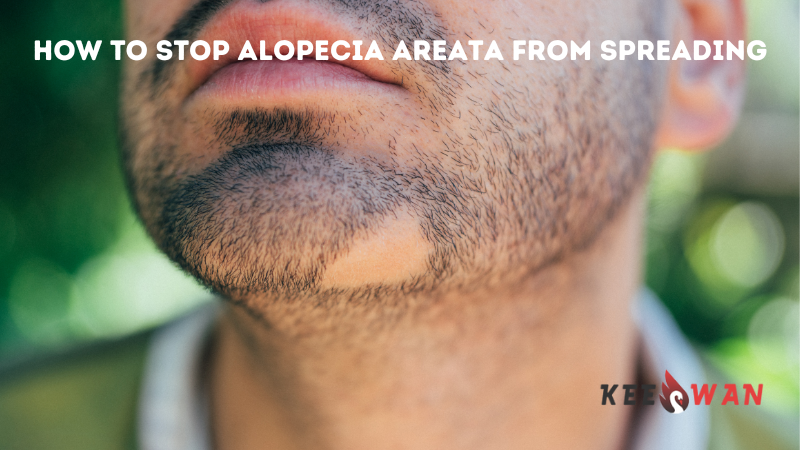What is Alopecia areata?
Alopecia areata is an autoimmune disorder in which the body’s immune system mistakenly attacks the hair follicles, resulting in hair loss. It usually causes small, round patches of baldness on the scalp, although hair loss can also occur on other parts of the body. It is not contagious and is generally not a serious health concern. Treatment options include topical steroids, immunotherapy, and light therapy.
Alopecia areata symptoms
Common symptoms of alopecia areata include:
-Patchy hair loss on the scalp, face, and/or other areas of the body
-Dry, scaly, itchy skin at the affected area
-Hair loss on the scalp that may appear in a circular or patchy pattern
-Excessive shedding of hair
-Thinning or breaking of the hair shaft
-Nail changes, such as pits in the nails or horizontal ridges
-In some cases, alopecia areata can cause total baldness (alopecia totalis) or loss of all body hair (alopecia universalis).
What are the complications of alopecia areata?
The main complication of alopecia areata is the psychological impact of hair loss, which can cause depression, anxiety, and low self-esteem. Other complications can include permanent hair loss (alopecia totalis or universalis) and scarring of the scalp. In rare cases, alopecia areata can lead to other autoimmune diseases such as thyroid disease, lupus, and vitiligo. In addition, people with alopecia areata have an increased risk of developing other skin conditions such as psoriasis and atopic dermatitis.
Precautions about alopecia areata
- Avoid stress – Stress can trigger or worsen alopecia areata, so make sure to practice stress-relieving activities such as yoga, meditation, and deep breathing.
- Get a haircut – If you experience hair loss, get a haircut to a shorter length so that the bald patches are less noticeable.
- Wear a wig or hat – Wearing a wig or hat can help to cover up the bald patches caused by alopecia areata, and can boost your confidence.
- Limit chemical treatments – Avoid using harsh chemicals and dyes on your hair, as they can further damage your hair and make it more prone to breakage.
- Eat a healthy diet – Eating a balanced diet full of fruits, vegetables, and lean proteins can help to promote healthy hair growth and keep your scalp healthy.
- Talk to a doctor – If you are experiencing symptoms of alopecia areata, it is important to talk to a doctor to determine the best course of treatment.
Alopecia areata treatments
- Corticosteroids: Corticosteroids are drugs that suppress the immune system. They can be used to treat alopecia areata by reducing inflammation and preventing further hair loss.
- Topical Immunotherapy: Topical immunotherapy is a treatment method that involves applying a chemical called diphencyprone (DPCP) directly to the affected area. The chemical stimulates the immune system to attack the hair follicles, leading to hair regrowth.
- Minoxidil: Minoxidil is a drug that is used to treat male-pattern baldness. It can also be used to treat alopecia areata by increasing blood flow to the scalp and stimulating hair regrowth.
- Wigs and Hairpieces: Wigs and hairpieces are a great option for those who want to disguise the effects of alopecia areata. Wigs and hairpieces can be customized to match the color and texture of your natural hair, making them virtually undetectable.
- Light Therapy: Light therapy is a treatment method that uses a laser or LED light to stimulate hair follicles and encourage regrowth. It is a relatively new treatment option for alopecia areata, but research suggests that it is effective in some cases.
How to stop alopecia areata from spreading
- Follow a healthy lifestyle: Eating a healthy diet, exercising regularly, and getting enough rest can help keep your hair healthy and may help prevent alopecia areata from spreading.
- Reduce stress: Stress can worsen alopecia areata symptoms, so it’s important to practice stress-reducing activities such as yoga, meditation, and deep breathing.
- Use topical corticosteroids: Applying topical corticosteroids to the affected areas can help slow down the progression of alopecia areata and may even help to regrow hair.
- Try light therapy: Light therapy, such as laser therapy and pulsed light therapy, may help to stimulate hair growth and prevent alopecia areata from spreading.
- Consider taking medications: If other treatments don’t work, certain oral medications, such as minoxidil, may help to slow down the progression of alopecia areata and even help to regrow hair.
Alopecia areata – FAQs
What are the causes of alopecia areata?
The cause of alopecia areata is unknown, but it is believed to be an autoimmune disorder. This means that the body’s immune system mistakenly attacks the hair follicles, leading to hair loss. Genetics, environmental factors, and stress may also play a role in the development of the condition.
What triggers alopecia areata?
Alopecia areata is an autoimmune disorder, meaning that the immune system mistakenly attacks the body’s own healthy cells and tissues. The exact cause of alopecia areata is unknown, but it is believed to be triggered by a combination of genetic and environmental factors. These may include stress, certain medications, infections, or other health conditions.
Does alopecia areata go away?
Alopecia areata is an unpredictable condition, and there is no way to predict how long it will last or if it will go away on its own. In some cases, the hair may grow back after a few months, while in other cases, the hair loss may be permanent. Treatment for alopecia areata is available, and it may help to reduce the severity of the condition and improve the chances of regrowth.
How do you get rid of alopecia areata?
The most effective treatment for alopecia areata is corticosteroid injections, which help to suppress the immune system and reduce inflammation. Other treatments include topical medications, light therapy, and immunosuppressants. In some cases, hair may regrow spontaneously, but it is important to note that there is no cure for alopecia areata.
Is alopecia areata a serious condition?
Alopecia areata is a chronic condition that can be difficult to manage, but it is not usually a serious or life-threatening condition. While it can cause psychological distress, most people with alopecia areata are able to lead normal lives. With treatment and support, they can learn to cope with the condition and maintain a sense of wellbeing.
Also, learn about how to treat cavity on front tooth at keeswan.com.





